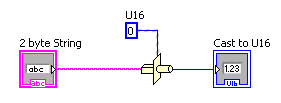- Subscribe to RSS Feed
- Mark Topic as New
- Mark Topic as Read
- Float this Topic for Current User
- Bookmark
- Subscribe
- Mute
- Printer Friendly Page
???16 bits string to integer conversion???
04-24-2007 10:43 AM
- Mark as New
- Bookmark
- Subscribe
- Mute
- Subscribe to RSS Feed
- Permalink
- Report to a Moderator
Could anyone suggest me a right way?
thanks a lot in advance,
win2s
04-24-2007 10:51 AM - edited 04-24-2007 10:51 AM
- Mark as New
- Bookmark
- Subscribe
- Mute
- Subscribe to RSS Feed
- Permalink
- Report to a Moderator
"Hexadecimal string to number" assumes that yuor string is formatted with characters 0..F. If your two bytes are an unformatted binary string, just typecast it to a number, using e.g. a I16 or U16 diagram constant as type.

Message Edited by altenbach on 04-24-2007 08:54 AM
04-24-2007 11:28 AM
- Mark as New
- Bookmark
- Subscribe
- Mute
- Subscribe to RSS Feed
- Permalink
- Report to a Moderator
In an attempt to save the time and sampled data in a spreadsheet, I add "get date/time in seconds" and convert it to "DBL", but the final data sheet contains the following data:
3260276410,751 2,410
3260276410,831 2,390
3260276410,921 2,395
3260276411,011 2,395
3260276411,092 2,405
3260276411,182 2,405
3260276411,272 2,405
3260276411,352 2,405
3260276411,442 2,385
3260276411,522 2,405
3260276411,612 2,390
3260276411,693 2,390
3260276411,783 2,395
3260276411,863 2,390
3260276411,953 2,414
3260276412,033 2,410
3260276412,123 2,395
3260276412,213 2,405
Is there a wise way to get the time serie starting from "0"? I failed to find a function getting initial time instant.
win2s
04-24-2007 01:09 PM
- Mark as New
- Bookmark
- Subscribe
- Mute
- Subscribe to RSS Feed
- Permalink
- Report to a Moderator
04-25-2007 02:11 AM
- Mark as New
- Bookmark
- Subscribe
- Mute
- Subscribe to RSS Feed
- Permalink
- Report to a Moderator
04-25-2007 11:50 AM
- Mark as New
- Bookmark
- Subscribe
- Mute
- Subscribe to RSS Feed
- Permalink
- Report to a Moderator
You don't need a function, it's the first value in the first column. 🙂
Within your code, you could place it in a shift register at [i]=0 and subtract it from the current time at each iteration. You'll get the relative times starting with zero.
04-25-2007 03:19 PM
- Mark as New
- Bookmark
- Subscribe
- Mute
- Subscribe to RSS Feed
- Permalink
- Report to a Moderator
04-25-2007 03:53 PM
- Mark as New
- Bookmark
- Subscribe
- Mute
- Subscribe to RSS Feed
- Permalink
- Report to a Moderator
@xianese wrote:
... I'm also wiling to know it.
What is "it"??? This thread talks about (1) typecasting a string to an integer and also about (2) relative time stamps.
I thought both questions have received an adequate answer here. If you still have problems after trying the above suggestions, please be more specific about your problem. 🙂
04-25-2007 04:16 PM
- Mark as New
- Bookmark
- Subscribe
- Mute
- Subscribe to RSS Feed
- Permalink
- Report to a Moderator
04-25-2007 05:30 PM - edited 04-25-2007 05:30 PM
- Mark as New
- Bookmark
- Subscribe
- Mute
- Subscribe to RSS Feed
- Permalink
- Report to a Moderator

Message Edited by altenbach on 04-25-2007 03:31 PM
